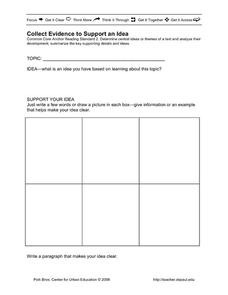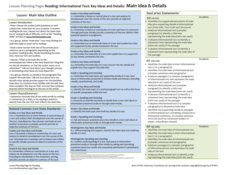Olathe Public Schools
Topic, Main Idea, Supporting Detail, and Theme
Get your class members thinking about a reading passage's topic, main idea, supporting details, and theme with this interactive presentation that asks scholars to define, locate, and review each term.
Polk Bros Foundation
I Can Identify a Nonfiction Writer's Main Idea and Supporting Examples
Use this page to quickly identify the central idea of a text and organize ideas for writing an informational or explanatory text. The worksheet is split into two parts. In the first part, pupils note down the main idea and supporting...
Polk Bros Foundation
Main Idea Analyzer
Show the connection between the main idea and supporting details with a graphic organizer. Pupils fill in the main idea of a text in the circle and the supporting ideas in the boxes connected to the circle.
Polk Bros Foundation
Collect Evidence to Support an Idea
In order to support an idea, writers must use evidence. Your class members can prepare their evidence with this basic worksheet. Writers note down the topic they are learning about and their own idea. Next, they come up with information...
Polk Bros Foundation
I Can Comprehend a Paragraph, then a Page/Section in a Text
Help your class tackle chunks of text with a simple graphic organizer. Pupils read three paragraphs and, as they read, draw pictures in the provided boxes that demonstrate what each paragraph says. There are three boxes on the page and...
For the Teachers
Main Idea Outline
Find the main idea in an informational text with a versatile lesson. Three levels of differentiation help you implement the strategy in any age or class level, based on the ability and objectives of your learners.
Polk Bros Foundation
Science Learning Summary Guide
Apply reading standards to your science curriculum by asking pupils to complete this guide. Individuals note down important vocabulary as well as two ideas they learned and two supporting facts for each idea. They then take this...
Curated OER
Researching the Past
Learners research the western movement in order to learn note taking strategies with nonfiction texts. They use the Internet to search for important information about the western movement using the Cornell Notes note-taking system. They...
Curated OER
Express Yourself Lesson Seed 3
If you're looking to set your class up for writing effective arguments, try out this idea. While originally created with freedom as a guiding idea, the activity could easily be adapted for other themes. As a class, create a chart of...
Polk Bros Foundation
Common Core Constructed Response Organizer
Get your writers ready to compose a constructed response essay in response to either an informational or fictional text. Pupils note down the big idea they wish to address as well as up to nine examples from the text that they wish to...
Curriculum Corner
ELA Common Core Checklists for K-6
In the hustle and bustle of life in the classroom, it's easy for teachers to lose track of the standards they have taught, and those that still need to be addressed. This Common Core checklist provides educators with an easy-to-use...
Polk Bros Foundation
Show, Then Write What You Learn
After reading a text or covering a new topic, have class members fill out the four boxes on this page with facts. Individuals can use words or drawings to represent the facts.
Museum of Tolerance
Immigration Journeys
Through the journey of four stories of immigration, scholars complete graphic organizers and apply knowledge to create a visual representation of their findings on a large poster. Third and fourth readers write a letter to their family...














